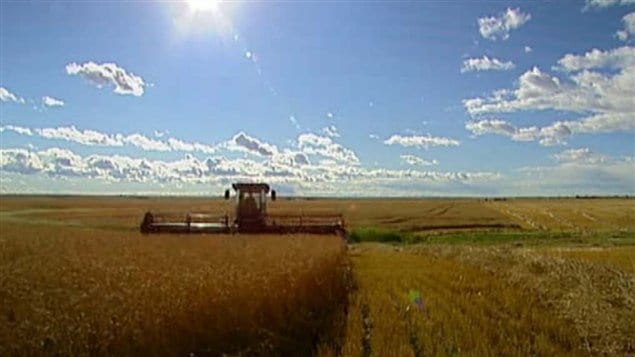It may seem a remote to most citizens and it has barely made the news, but farmers of all kinds across Canada are extremely concerned about proposed new legislation. It would increase rights of plant patent holders and limit farmers abilities to re-use their own seed.
Glenn Tait runs a family grain and cattle farm in Meota, Saskatchewan and is a board member on the National Farmers Union.
ListenFarmers say Canada’s proposal (Bill C-18 to agree to UPOV-91), would hand over control of seeds and seed development to giant multi-national corporations.

The International Union for the Protection of New Varieties of Plants (UPOV) is an intergovernmental organization based in Switzerland. It developed proposals, adopted as laws, that allow seed developers to claim property rights similar to patents.
Canada joined UPOV and adopted its 1978 model law by passing the Plant Breeders’ Rights Act in 1990. The 1991 model law, known as UPOV ’91, enhances the rights of multinational seed companies such as Monsanto, Syngenta, Bayer, Dow, Viterra, Pioneer, DuPont and Cargill.
“Ultimately what we’re doing is giving up our sovereignty over seeds and over food” T Boehm
On November 13, 2013, Canada’s Agriculture Minister, Gerry Ritz, announced that Canada plans to sign on to UPOV ’91 by August 1, 2014. On December 9, 2013 he introduced an omnibus agriculture bill in Parliament, called the “Agricultural Growth Act” which contains the required amendments to the Plant Breeders Rights Act to conform with UPOV ’91 among other measures.

Further, the federal government is closing the publicly-funded Cereal Research Centre. Public funds will now only go toward development of new varieties to the “germplasm” level, after which the new breeds would be handed to private interests for development.
The farmers say multinationals will be doubly rewarded, first by having the public fund initial research, then charging royalties for developed varieties they would then control.
Glenn Tait says the new rules are also not clear on the vague concept of “farmer’s privilege” to keep seed for replanting, which is not actually written into law, and which could easily disappear. Even if protected, it could be superseded by patent-holder rights related to seed cleaning and/or storage.

He notes the proposed new law will apply to all crops from apples, to tomatoes, from wheat, to zucchini.
Tait says he can see the multinationals gaining complete control of crop production by controlling what varieties they propose for “registration”. This is in combination with the Canadian requirement that only registered varieties can be sold for human consumption.
The companies can also easily apply to de-register older and more commonly used varieties, thereby pushing farmers to “new” and more profitable patents.
He adds that unlike publicly-funded research, multinationals are not concerned about improving nutrition in the crops, but rather developing varieties which are to be directly integrated with their other products such as herbicides, thereby increasing profits even further
He says if the new law is passed, he can see the day when farmers lose their independence, merely becoming a sort of tenant working for multinational patent holders.
Consumers may see reduced biodiversity in the numbers of varieties of fruits and vegetables, as the patent holders stop producing less profitable varieties.
On it’s website, the NFU lists letters of support from dozens of agricultural groups around the world.
You Tube NFU part 1, (what is UPOV-91
part 2 -(royalties and cascading rights)







For reasons beyond our control, and for an undetermined period of time, our comment section is now closed. However, our social networks remain open to your contributions.